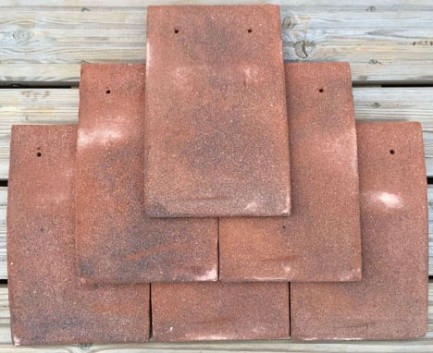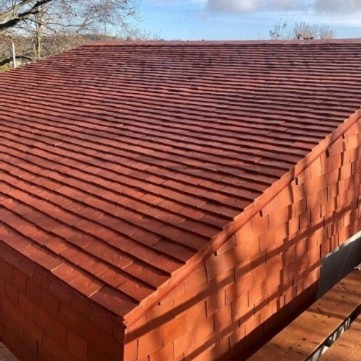Clay Roof Tiles in Bedfordshire
Heritage Tiles: Emblematic of the finest craftsmanship
Heritage tiles are the professional roofer's choice for the highest quality clay roof tiles. We pride ourselves in manufacturing, stocking, and delivering the very finest in prestige clay roof tiles.
Heritage Tiles have several tile ranges that satisfy every architectural requirement. Vintage and historic properties right up to modern new builds are covered by the diverse range of clay roof tiles that we stock.
So, whether you are in the building trade, or simply wish to choose your own tiles, Heritage Tiles have the right product for your specific requirements.
What Heritage Tiles have to offer our customers?
- We offer specification and technical solutions to help you achieve the perfect build.
- We also offer expert design advice to all our customers.
- We are happy to engage in site visits with our clients.
- We have stockists and distributors throughout the United Kingdom to ensure that we can provide our expert service to a wider area.
- We can provide estimated quantities from plans supplied by our clients.
- We offer battening plans.
- We can deliver a standard and bespoke colour choice for our clay tile products.
- All our tiles are assessed and approved by Lucideon.
- We provide a nationwide delivery and collection service.
The ranges of clay roof tiles we supply.
The Clayhall Range of roof tiles:

Clayhall Medium Blend - Carefully crafted to replicate all the features of handmade the Clayhall hand crafted range of tiles offers an excellent alternative when budget restrictions are a concern, but without compromising quality or durability.
Clayhall Dark Blend - Quality and durability in a budget clay roof tile. The Clayhall dark blend is sure to turn heads.
Clayhall Red Blend - A beautiful rustic clay roof tile. The Clayhall red blend is a firm favourite with our customers.
Clayhall Hamlet Mix - The Clayhall Hamlet mix is a gorgeous light and sandy looking clay roof tile that is a perennial favourite in the building trade.
Clayhall Birchwood Mix - The Clayhall Birchwood mix offers a gorgeous blend of lighter and darker shades in this diverse clay roof tile. If you are concerned that your roof tiles could look monotonous, the Clayhall Birchwood mix is the clay roof tile to choose.
The Conservation Range of roof tiles

The Conservation range of roof tiles are available in a range of distinctive colours, created by using a very fine sand, The Conservation Weathered; A natural warm tone, achieving an instant mellow and settled look and The Conservation Red; perfect for vertical tiling especially suited for villages and hamlets with olde world vernacular charm.
Manufactured using high quality clay, achieving high strength and durability properties, giving homeowners and contractors peace of mind for many years to come. The conservation range comes with a complete set of associated fittings, including Hog Back Ridge, Half Round Ridge, Bonnet Hips, Valley tiles and External Angles.
The Conservation range of clay roof tiles comes in the following variations:
- Conservation Red
- Conservation Weathered
- Conservation Dark
Conservation Peg Tile
Plain clay roofing tiles laid to a double lap have been used for roof covering in England since before the Norman Conquest and tiles dating back to Roman Times have been discovered under excavation. From the outset clay plain tiles were made incorporating fixing features.
The Classic Edwardian roof tile
The Classic range of plain tiles is one of the finest ranges of clay tiles.
We source only the best raw materials for our craftsman to create beautifully handmade clay tiles of the highest quality and durability.
Tile Fittings available from Heritage Tiles
There are many fittings that are available from us a Heritage Tiles to complete your build to perfection. We stock and supply the following:
- Gable Tile
- Eave Tile
- Baby Porch Ridge
- 90 Degree Ext. Angle
- Universal Bonnet Hip
- Half Round Ridge
- Hogs Back Ridge
- Mono Ridge
- Third Round Ridge
- Universal Valley
- Ornamental Club
- Bat Tile Set
Bat Tiles:
Provide help for our bats with our range of bat friendly roof tiles.
Did you know that all UK bats and their roosts are protected by law? The Wildlife and Countryside Act introduced in 1981, gave legal protection to all bat species and their roosts in England.
Distinct species of bats prefer differing places to roost. The two most usually found species of bat in the UK are the Pipistrelle and Brown Long-Eared Bat. Pipistrelle prefer confined spaces such as under tiles on roofs and hanging spaces. The Brown Long-Eared Bat prefer roof timbers and ridges inside lofts. Heritage Clay Tiles can provide purpose made access points within your roof tiles or ridge tiles. The Bat Tile Set can form part of a mitigation package required by law for existing roosts or as potential access where a roost had not previously been present.
Select a Blend
Getting the right blend for your roofing project can feel daunting, but with our blend generator you can mix and match various blends of tiles to achieve the perfect blend.
Click here to make use of our online tool to choose your own unique blend.
Because our strict quality control provides a consistent tile size you can mix assorted styles and colours of tiles to make your roof unique to you. Please use the tool below to experiment with various blends.
Adjust the sliders to set the ingredients for your desired blend then click on the update mix button.
Alternatively click on any blend or tile to display it.
Whatever type of clay roof tile you want, Heritage Tiles will be able to help.
Clay Roof Tiles
Clay roof tiles have a long and rich history and have stood the test of time on countless buildings throughout the years. The manufacturers of clay roof tiles typically guarantee the tiles for a period of thirty years and state that sixty years is a perfectly reasonable service life.
One only has to walk around and look at the buildings in many areas to see that the clay roof tiles have been in place for even longer than the upper age range of sixty years.
Clay roof tiles have been the go-to finishing touch on roofs for many centuries. Some manufacturers of clay roof tiles produce a wealth of designs and shades to suit any property and budget, whereas others tend to specialise in a more targeted production or style.
How to predict the longevity of a clay roof tile
At present, no in-service test exists for any roof tile. The only way to predict the quality and longevity of a clay roof tile is to look to the British Standards for clay roof tiles. These contain several tests that determine the suitability of new clay roof tiles during production.
The test methods include a range of testing parameters, such as dimensional regularity, the width, flatness and freeze-thaw resistance of the clay roof tile, as well as the flexural strength and how they stand up to water permeability.
Two criteria, namely the dimensional and flatness measurements will not apply to clay roof tiles that have already provided many years of reliable service. Also, the freeze-thaw resistance test, which checks for cracking, flaking and splitting of the tiles after a series of freezing and thawing cycles, is not a good test for tiles that have endured many British winters over the years.
The clay roof tiles must have sufficient flexural strength to resist strong winds too. This is resistance would most likely be an up-lift force, where the strong wind would lift the lower edge of the clay roof tile. The requisite standard set out is that the clay roof tiles should possess a minimum flexural strength of six hundred Newtons.
You can measure the flexural strength of a set of clay roof tiles if they have been removed from several areas of the roof and subjected to a simulated force.
Clay roof tiles must also be waterproof
The water permeability test determines whether a tile is so porous that water can seep through it. Tiles are bonded to the bottom of frames that are then filled with water. The test is passed if no water drips from the bottom of the tiles within twenty-four hours. Clearly, the very last thing you want is a clay roof tile that fails to keep the rain out.
The durability and longevity of a roof is governed by the condition of all the different components that complete the structure, including the timber battens and rafters, the underfelt, the roofing nails and the quality of the clay roof tile installation.
Should all the various elements that make up the roof be sound and of good quality, there is no reason why a clay roof tile should not last many years beyond the sixty-year mark.
A little information about Bedfordshire
Bedfordshire food
The Bedfordshire clanger is a convenience food from Bedfordshire and adjacent counties in England, such as Buckinghamshire and Hertfordshire. It dates back to at least the 19th century. You can still find this local offering at various bakers and served in some cafes, restaurants and local places of interest in and around Bedfordshire.
The word "clanger" is related to the dialect term "clung", with the meaning leaning towards "heavy", in relation to food.
So, what is the Bedfordshire Clanger?
The clanger is a long suet crust dumpling, which is sometimes described as a savoury type of roly-poly pudding. Its name may refer to its dense consistency. A 19th-century English Dialect Dictionary recorded the phrase "clung dumplings" from Bedfordshire, citing "clungy" and "clangy" as adjectives meaning heavy or close-textured.
Bedfordshire Clangers were historically made by women for their husbands to take to their agricultural work as an easy and quick meal. Many argue that the crust was not originally intended to be eaten, but to protect the fillings from the dirty hands of the workers. They could be eaten cold, or warmed by being wrapped in damp newspaper under a brazier. While sometimes associated with the hatmakers of the Luton district of Bedfordshire, the same dish was also recorded in rural Buckinghamshire, Cambridgeshire and Hertfordshire.
Making the Bedfordshire Clanger
The Bedfordshire Clanger was traditionally boiled in a cloth like other suet puddings, though some modern recipes use a shortcrust or other pastry and suggest baking it like a pasty, a method dating from a 1990s revival of the dish by a commercial bakery. The dumpling can be filled with liver and onion, bacon and potatoes, pork and onions, or other meat and vegetables, and flavoured with the garden herb sage.
Usually a savoury dish, clangers were also said to have been prepared with a sweet filling, such as jam or fruit, in one end; this variant is referred to in a Bedfordshire Magazine of the 1960s as a half and half, with "clanger" reserved for a savoury version. A 1959 reference also suggests that clangers were usually savoury, stating that the version with a sweet filling in one end was called the Trowley Dumpling after the hamlet in west Hertfordshire where it was supposed to have originated. There is some doubt as to how often a sweet filling was traditionally added in practice, though modern recipes often imitate the folklore by including one.
Variations of the Bedfordshire Clanger
A similar dumpling was known in parts of Buckinghamshire, particularly Aylesbury Vale, as a "Bacon Badger". It was made from bacon, potatoes and onions, flavoured with sage and enclosed in a suet pastry case, and was usually boiled in a cloth. The etymology of "badger" is unknown but might relate to a former term for a dealer in flour. "Badger" was widely used in the Midland counties in the early 19th century to refer to a "cornfactor, mealman, or huckster". The same basic suet dumpling recipe is known by a variety of other names elsewhere in the country; "flitting pudding" is recorded in County Durham, "dog in blanket" from Derbyshire, and "bacon pudding" in Berkshire and Sussex.
Products available from Heritage Clay Tiles Ltd in East Sussex
Clay Roof Tiles in East Sussex
Clayhall Roof Tiles in East Sussex
Conservation Roof Tiles in East Sussex
Edwardian Roof Tiles in East Sussex
Victorian Roof Tiles in East Sussex
Georgian Roof Tiles in East Sussex
Handmade Clay Tiles in East Sussex
Handmade Roof Tiles in East Sussex
High Quality Roof Tiles in East Sussex
Traditional clay tiles in East Sussex
Traditional roof tiles in East Sussex
Products available from Heritage Clay Tiles Ltd in Essex
Conservation Roof Tiles in Essex
High Quality Roof Tiles in Essex
Traditional clay tiles in Essex
Traditional roof tiles in Essex
Products available from Heritage Clay Tiles Ltd in Hampshire
Clayhall Roof Tiles in Hampshire
Conservation Roof Tiles in Hampshire
Edwardian Roof Tiles in Hampshire
Victorian Roof Tiles in Hampshire
Georgian Roof Tiles in Hampshire
Handmade Clay Tiles in Hampshire
Handmade Roof Tiles in Hampshire
High Quality Roof Tiles in Hampshire
Traditional clay tiles in Hampshire
Traditional roof tiles in Hampshire
Products available from Heritage Clay Tiles Ltd in Hertfordshire
Clay Roof Tiles in Hertfordshire
Clayhall Roof Tiles in Hertfordshire
Conservation Roof Tiles in Hertfordshire
Edwardian Roof Tiles in Hertfordshire
Victorian Roof Tiles in Hertfordshire
Georgian Roof Tiles in Hertfordshire
Handmade Clay Tiles in Hertfordshire
Handmade Roof Tiles in Hertfordshire
High Quality Roof Tiles in Hertfordshire
Traditional clay tiles in Hertfordshire
Traditional roof tiles in Hertfordshire
Products available from Heritage Clay Tiles Ltd in Kent
Conservation Roof Tiles in Kent
High Quality Roof Tiles in Kent
Traditional clay tiles in Kent
Traditional roof tiles in Kent
Products available from Heritage Clay Tiles Ltd in London
Conservation Roof Tiles in London
Edwardian Roof Tiles in London
Victorian Roof Tiles in London
High Quality Roof Tiles in London
Traditional clay tiles in London
Traditional roof tiles in London
Products available from Heritage Clay Tiles Ltd in Surrey
Conservation Roof Tiles in Surrey
Edwardian Roof Tiles in Surrey
Victorian Roof Tiles in Surrey
High Quality Roof Tiles in Surrey
Traditional clay tiles in Surrey
Traditional roof tiles in Surrey
Products available from Heritage Clay Tiles Ltd in West Sussex
Clay Roof Tiles in West Sussex
Clayhall Roof Tiles in West Sussex
Conservation Roof Tiles in West Sussex
Edwardian Roof Tiles in West Sussex
Victorian Roof Tiles in West Sussex
Georgian Roof Tiles in West Sussex
Handmade Clay Tiles in West Sussex
Handmade Roof Tiles in West Sussex
High Quality Roof Tiles in West Sussex
Traditional clay tiles in West Sussex
Traditional roof tiles in West Sussex
Products available from Heritage Clay Tiles Ltd in Bedfordshire
Clayhall Roof Tiles in Bedfordshire
Conservation Roof Tiles in Bedfordshire
Edwardian Roof Tiles in Bedfordshire
Victorian Roof Tiles in Bedfordshire
Georgian Roof Tiles in Bedfordshire
Handmade Clay Tiles in Bedfordshire
Handmade Roof Tiles in Bedfordshire
High Quality Roof Tiles in Bedfordshire
Traditional clay tiles in Bedfordshire
Traditional roof tiles in Bedfordshire
Products available from Heritage Clay Tiles Ltd in Berkshire
Clayhall Roof Tiles in Berkshire
Conservation Roof Tiles in Berkshire
Edwardian Roof Tiles in Berkshire
Victorian Roof Tiles in Berkshire
Georgian Roof Tiles in Berkshire
Handmade Clay Tiles in Berkshire
Handmade Roof Tiles in Berkshire
High Quality Roof Tiles in Berkshire
Traditional clay tiles in Berkshire
Traditional roof tiles in Berkshire
Products available from Heritage Clay Tiles Ltd in Buckinghamshire
Clay Roof Tiles in Buckinghamshire
Clayhall Roof Tiles in Buckinghamshire
Conservation Roof Tiles in Buckinghamshire
Edwardian Roof Tiles in Buckinghamshire
Victorian Roof Tiles in Buckinghamshire
Georgian Roof Tiles in Buckinghamshire
Handmade Clay Tiles in Buckinghamshire
Handmade Roof Tiles in Buckinghamshire
High Quality Roof Tiles in Buckinghamshire
Traditional clay tiles in Buckinghamshire
Traditional roof tiles in Buckinghamshire
Products available from Heritage Clay Tiles Ltd in Cambridgeshire
Clay Roof Tiles in Cambridgeshire
Clayhall Roof Tiles in Cambridgeshire
Conservation Roof Tiles in Cambridgeshire
Edwardian Roof Tiles in Cambridgeshire
Victorian Roof Tiles in Cambridgeshire
Georgian Roof Tiles in Cambridgeshire
Handmade Clay Tiles in Cambridgeshire
Handmade Roof Tiles in Cambridgeshire
High Quality Roof Tiles in Cambridgeshire
Traditional clay tiles in Cambridgeshire
Traditional roof tiles in Cambridgeshire
Products available from Heritage Clay Tiles Ltd in Oxfordshire
Clay Roof Tiles in Oxfordshire
Clayhall Roof Tiles in Oxfordshire
Conservation Roof Tiles in Oxfordshire
Edwardian Roof Tiles in Oxfordshire
Victorian Roof Tiles in Oxfordshire
Georgian Roof Tiles in Oxfordshire
Handmade Clay Tiles in Oxfordshire
Handmade Roof Tiles in Oxfordshire
High Quality Roof Tiles in Oxfordshire
Traditional clay tiles in Oxfordshire
Traditional roof tiles in Oxfordshire
Products available from Heritage Clay Tiles Ltd in Suffolk
Clayhall Roof Tiles in Suffolk
Conservation Roof Tiles in Suffolk
Edwardian Roof Tiles in Suffolk
Victorian Roof Tiles in Suffolk
Georgian Roof Tiles in Suffolk
Handmade Clay Tiles in Suffolk
Handmade Roof Tiles in Suffolk
High Quality Roof Tiles in Suffolk
Traditional clay tiles in Suffolk
Traditional roof tiles in Suffolk
Further Information
If you would like to know more or are interested in a quote we would be happy to help. Phone us on 01634 471 344, email us at sales@heritagetiles.co.uk and we will be in touch as soon as possible.







